Duck Memories
I guess this oncoming fall season makes some of us think more about hunting and past experiences than it does about the river so close at hand – at least for a little while.
In the last blog posting I mentioned that there was still some story material to be explored in another form of hunting: ducks. From the time I can first remember I was intrigued by the d
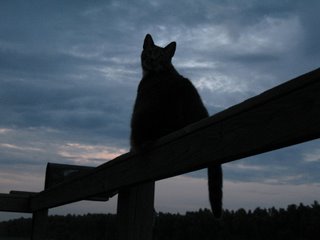 ucks my father would bring back from that mysterious place one went to from time to time – the camp, a place I wasn’t really sure existed in reality until I finally was allowed to go there. Somehow visits to the camp would always sound like that wonderful place where men went and did men things and their clothing came back smelling like that oddly attractive odor of waterfowl feathers mixed with marsh mud and gasoline. I would ask a thousand questions of my father when he returned. He would put his ducks on the ground and I would go through them one by one and ask what they were. In those days the limit was 25 of anything with a flat beak and webbed feet that you could bring down with a 10-gauge shotgun or smaller, so there usually was a good bunch of birds for me to ask questions about. Just from being a good hunter, my father knew a lot about the practical side of ducks – what they ate, how they swam, which ones would decoy, what a “quack” call would work on, how they would approach a set of decoys, how they would orient to the wind, how to tell a mallard from a pintail flying 1000 feet up, and much more. In the end, I always exhausted his patience with my questions. I believe I would have gone on for hours just listening.
ucks my father would bring back from that mysterious place one went to from time to time – the camp, a place I wasn’t really sure existed in reality until I finally was allowed to go there. Somehow visits to the camp would always sound like that wonderful place where men went and did men things and their clothing came back smelling like that oddly attractive odor of waterfowl feathers mixed with marsh mud and gasoline. I would ask a thousand questions of my father when he returned. He would put his ducks on the ground and I would go through them one by one and ask what they were. In those days the limit was 25 of anything with a flat beak and webbed feet that you could bring down with a 10-gauge shotgun or smaller, so there usually was a good bunch of birds for me to ask questions about. Just from being a good hunter, my father knew a lot about the practical side of ducks – what they ate, how they swam, which ones would decoy, what a “quack” call would work on, how they would approach a set of decoys, how they would orient to the wind, how to tell a mallard from a pintail flying 1000 feet up, and much more. In the end, I always exhausted his patience with my questions. I believe I would have gone on for hours just listening.The camp my father went to was leased by several men from New Iberia with names like Harris, Dauterive, and Derouen. I think most of the group is in this picture from 1950. It was located on a feature called Warren Ditch, below Gueydan, the duck capital of the world. My father’s contribution to the camp was his ability to cook good
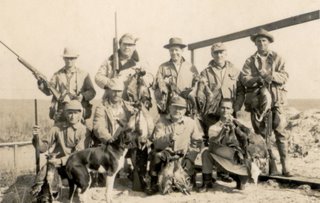 food. This was not a big camp, it would sleep about ten people, so there usually wasn’t enough room for me but I pestered him until he found a time that worked out. I also think that the men weren’t too happy with a young boy observing men behavior at the camp – poker, and cussing and drinking and raucous conversation and all that. I was nine years old when I finally was allowed to go. Because of my age, I guess, my father was allowed to take me out on an afternoon hunt, a practice usually banned by order of the club rules. But out we went for my first duck hunt.
food. This was not a big camp, it would sleep about ten people, so there usually wasn’t enough room for me but I pestered him until he found a time that worked out. I also think that the men weren’t too happy with a young boy observing men behavior at the camp – poker, and cussing and drinking and raucous conversation and all that. I was nine years old when I finally was allowed to go. Because of my age, I guess, my father was allowed to take me out on an afternoon hunt, a practice usually banned by order of the club rules. But out we went for my first duck hunt.It was one of the rice field blinds. The whole lease was for two square miles, about half rice field and half natural marsh. It was a clear day, I think, with a southwest wind blowing. The gun I had was a double-barreled 410, not the gauge of choice for duck hunting, but that’s what I had and had again the next year. The picture was taken the following year. Note the rubber bands used to hold the boots on. In those days they didn't make boots to fit 10-year olds. The blind was sunk into a rice levee, and brushed up to look like a bush. My father was almost maniacal about brushing a blind. He was convinced that a duck could detect a human if it could see one square inch of unbrushed clothing a quarter mile away. That’s an exaggeration but memories are what they are. I could hardly see over the bushes to look out for something to s
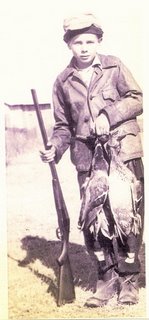 hoot at, and that’s true. We stood there for a while, me standing on the seat (a 5-gallon can), scanning the afternoon sky. I didn’t know it, but my father was demonstrating my first lessons in how to hunt ducks from a blind. At some point, my father hissed “There’s a pair of big ducks”. I say hissed because he also thought ducks had an abnormally acute sense of hearing, to add to their visual talents. And sure enough, there out over the field about a quarter mile away were two ducks kind of looking around, casually like. He hissed “Get down and try to look through the grass”. I did, and I did. He called a couple times with the “Hey look over here” four-quack call, and in a moment said, hissing even lower, “They’re coming!” By some miracle I caught sight through the brush of the pair of birds coming toward us. He called a couple more times, ending with the single call of a greenhead mallard. He hissed at an even less audible level “Get up when I say take em”. I may have said OK or something like that but probably not because I know I hadn’t taken a breath since the ducks had swung in our direction. Then he started to hiss “Wait…..wait….wait…”, pause, then much louder
hoot at, and that’s true. We stood there for a while, me standing on the seat (a 5-gallon can), scanning the afternoon sky. I didn’t know it, but my father was demonstrating my first lessons in how to hunt ducks from a blind. At some point, my father hissed “There’s a pair of big ducks”. I say hissed because he also thought ducks had an abnormally acute sense of hearing, to add to their visual talents. And sure enough, there out over the field about a quarter mile away were two ducks kind of looking around, casually like. He hissed “Get down and try to look through the grass”. I did, and I did. He called a couple times with the “Hey look over here” four-quack call, and in a moment said, hissing even lower, “They’re coming!” By some miracle I caught sight through the brush of the pair of birds coming toward us. He called a couple more times, ending with the single call of a greenhead mallard. He hissed at an even less audible level “Get up when I say take em”. I may have said OK or something like that but probably not because I know I hadn’t taken a breath since the ducks had swung in our direction. Then he started to hiss “Wait…..wait….wait…”, pause, then much louder 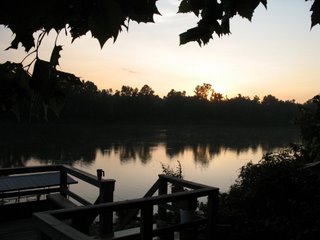 “Take em!” I stood with the little gun and managed to find the birds after losing sight of them as I stood up. What should have happened is that I forgot to take the safety off, but it didn’t. God is good. The two mallards, a pair, were flying very slowly over the decoys in perfect range about ten feet over the water from my left to my right, not intending to land, just cruising over and looking around. I put the flat platform of the double-barrel in front of the greenhead (he was in the lead) and led him about a foot and pulled the trigger and threw all of the little 410 shell’s #6 shot in his direction. He folded in a very complete and final fashion. I would say he crumpled, but that doesn’t describe the feeling I had as I saw the bird die and fall to the water. I was a little awed, I believe. I do clearly remember screaming in a much less dignified way “I got him!”, and my father saying loudly “Good shot! You sure got him!” Then , remembering I had another shot available, I looked for the other duck but she was long gone. I asked my father why he hadn’t shot at the other duck, and he said he didn’t notice that there were two ducks. I believe that he was so focused on what would happen with my first encounter with shooting that 410 at a real duck, he didn’t notice the other duck even though it was maybe three feet behind the first one. He would never admit this, he wasn’t one to express emotions, but I know that’s what happened.
“Take em!” I stood with the little gun and managed to find the birds after losing sight of them as I stood up. What should have happened is that I forgot to take the safety off, but it didn’t. God is good. The two mallards, a pair, were flying very slowly over the decoys in perfect range about ten feet over the water from my left to my right, not intending to land, just cruising over and looking around. I put the flat platform of the double-barrel in front of the greenhead (he was in the lead) and led him about a foot and pulled the trigger and threw all of the little 410 shell’s #6 shot in his direction. He folded in a very complete and final fashion. I would say he crumpled, but that doesn’t describe the feeling I had as I saw the bird die and fall to the water. I was a little awed, I believe. I do clearly remember screaming in a much less dignified way “I got him!”, and my father saying loudly “Good shot! You sure got him!” Then , remembering I had another shot available, I looked for the other duck but she was long gone. I asked my father why he hadn’t shot at the other duck, and he said he didn’t notice that there were two ducks. I believe that he was so focused on what would happen with my first encounter with shooting that 410 at a real duck, he didn’t notice the other duck even though it was maybe three feet behind the first one. He would never admit this, he wasn’t one to express emotions, but I know that’s what happened.After the moment had kind of completed itself, I jumped to the side of the blind and started to get out and go and get the duck. But my father said no, he would go and get it. He was concerned that I would fall down in the water, and get wet and get sick, or something. And I would have fallen, too. The ponds in those rice fields were often made by running a tractor round and round to beat the rice down. If it was wet when they did that, they made a mess of ruts and hills that you couldn’t see because they were underwater. Yep, I would have set off determined to go and get my duck and would have ended up on my face in 18 inches of cold water. But what a moment! What a thing to be able to remember after 58 years of living beyond that afternoon! That was the only duck we killed that day.
In the following years there were other notable events at that duck camp. I will relate only one more for
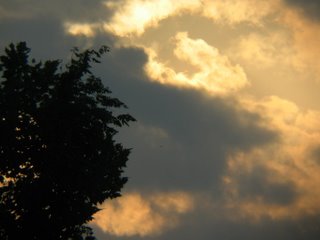 this posting. The next year I managed to get to the camp several times. I was ten years old now, and a seasoned killer of ducks, and the men didn’t seem to mind that I was there. There was this one evening, a Friday it was, and there must have been about eight or nine men in addition to my father and me. My father cooked up the usual, almost ritual, duck gumbo for supper. Early in the evening, a federal game warden showed up to talk hunting. He was known to the men, and was considered a good friend. He ate gumbo and stayed past the time I went to bed. He told them that he and some other game agents had a place staked out near Lake Arthur that they would visit the next morning. In the morning all the hunters divided up into who was going to hunt which blinds, and everyone left before daylight, as usual. My father and I would hunt the nearest blind, the same one I had killed my first duck in the year before. To get there we had to put a little three-horse Johnson outboard on this little ten-foot bateau and motor down this small canal for about a half mile, then park the boat and walk the rice field levees to the blind. We had a dog by this time. He was a mixed breed Chesapeake, and he loved to retrieve ducks. He wasn’t taught anything, he just starting do it on his own. Actually, what happened was my father didn’t think he was worth much so he brought him out to the camp to just kind of be a camp dog (I don’t know how the dog managed to go from weekend to weekend with no people at the camp). After a few weeks, someone called my father and told him he had a pretty good retriever. When asked what they meant, they told him that they had been hunting at night during the full moon, and they took the dog just for fun, and he turned out to be able to find the downed ducks in the dark and was a real asset. Surprise! Suddenly the dog had status and rode in the car back and forth every weekend. It shouldn't be a surprise that people hunted after dark, if they could get away with it. The thrill of waiting to get a silhouette of a duck crossing the moon is really something, so they tell me.
this posting. The next year I managed to get to the camp several times. I was ten years old now, and a seasoned killer of ducks, and the men didn’t seem to mind that I was there. There was this one evening, a Friday it was, and there must have been about eight or nine men in addition to my father and me. My father cooked up the usual, almost ritual, duck gumbo for supper. Early in the evening, a federal game warden showed up to talk hunting. He was known to the men, and was considered a good friend. He ate gumbo and stayed past the time I went to bed. He told them that he and some other game agents had a place staked out near Lake Arthur that they would visit the next morning. In the morning all the hunters divided up into who was going to hunt which blinds, and everyone left before daylight, as usual. My father and I would hunt the nearest blind, the same one I had killed my first duck in the year before. To get there we had to put a little three-horse Johnson outboard on this little ten-foot bateau and motor down this small canal for about a half mile, then park the boat and walk the rice field levees to the blind. We had a dog by this time. He was a mixed breed Chesapeake, and he loved to retrieve ducks. He wasn’t taught anything, he just starting do it on his own. Actually, what happened was my father didn’t think he was worth much so he brought him out to the camp to just kind of be a camp dog (I don’t know how the dog managed to go from weekend to weekend with no people at the camp). After a few weeks, someone called my father and told him he had a pretty good retriever. When asked what they meant, they told him that they had been hunting at night during the full moon, and they took the dog just for fun, and he turned out to be able to find the downed ducks in the dark and was a real asset. Surprise! Suddenly the dog had status and rode in the car back and forth every weekend. It shouldn't be a surprise that people hunted after dark, if they could get away with it. The thrill of waiting to get a silhouette of a duck crossing the moon is really something, so they tell me.But back to the story. We loaded the dog into the boat and ourselves and took off to the blind. We had a slow morning and it was very cold, so we quit early and loaded up and started back to the camp. We had maybe eight ducks between us, not even a limit. We walked the rice levee and got in the boat and started back up the canal toward the camp. Just before we got to the camp there were two poule d’eaus swimming ahead of the boat along the left edge of the canal. The dog, Taffy was his name by now, was at the front of the boat straining toward the poule d’eaus. My father, running the motor, said “Go ahead and shoot them just so the dog can have something to retrieve”. So I loaded the 410 and shot one of the birds on the water. At that moment a man stood up out of the high grass on the right edge of the canal not 30 feet away and waved us in. If the birds had been swimming on that side of the canal I’m sure I would have shot the man, and that would really have been a bad move. Sure enough, it was the federal warden that was supposed to be in Lake Arthur chasing other people that morning. When we got to the bank he said “Del, I didn’t think you would do that”. I honestly don’t think my father knew that something illegal had been done. “Do what?” “Your son shot that coot from a moving motorized boat. That’s against the law.” Of all the things that you knew to be wary about, and worried about, if a game warden was around – too many ducks, no plug in the gun, shooting after dark, baiting the ducks – shooting a poule d’eau from a boat going less than one mile an hour was not one of them. Nevertheless, he took our guns, and our ducks and escorted us to the camp, which was only about 200 feet away. He made us go into the camp and sit on a bunk and not move around or go outside. We were the first ones to come back that morning, and there was an agreed-upon signal between all the hunters at that camp, that if there was trouble someone should hang a white handkerchief on a nail in a certain place outside so that the other returning hunters would know to be legal when they came in, or not come it at all. Well, either the agent knew about the signal, or knew generally about the signal idea, because he made sure we didn’t communicate with anyone. And, as each other pair of hunters came in, each one was arrested for something (too many ducks, usually) and made to sit inside the camp. So, everyone was arrested that morning, including me, at ten years of age. The agent confiscated all the guns, issued citations
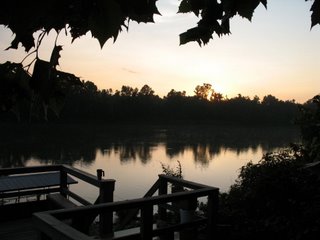 to everyone except me. He gave it my father instead. What eventually happened is that months later the judge allowed one hunter to assume the liability for everyone. He appeared in federal court in Opelousas and was fined and his license taken away for the next year (I think). Our guns were returned and I never heard any more discussion about the event. I did worry about the agent lying to us and laying the trap like he did. My father just said “Yep”, and continued to polish the bar in his restaurant. I think he was very embarrassed by the whole thing. As for me, do you think that experience makes a lasting impression? Really?
to everyone except me. He gave it my father instead. What eventually happened is that months later the judge allowed one hunter to assume the liability for everyone. He appeared in federal court in Opelousas and was fined and his license taken away for the next year (I think). Our guns were returned and I never heard any more discussion about the event. I did worry about the agent lying to us and laying the trap like he did. My father just said “Yep”, and continued to polish the bar in his restaurant. I think he was very embarrassed by the whole thing. As for me, do you think that experience makes a lasting impression? Really?Much more happened in the following years in connection with hunting ducks on the Warren Ditch. The big lease folded, and the camp was abandoned. My father knew the landowner, a Mr. Trahan, and wanted to see if we could get a lease or permission otherwise to hunt one blind in the rice field closest to where the camp had been. The old man (as my father called him) didn’t want to lease anything or create a legal commitment of any kind, but he agreed to let my father and me hunt that blind from year to year free of a monetary exchange. He was wealthy and didn’t need them, but we brought him turkeys for Thanksgiving and bottles of bourbon from time to time. He had a market hunter (remember this was around 1947) who would go out and kill ducks for the old man to give his doctors in New Orleans. At the time, it was common knowledge that this kind of market hunting went on. This will be the subject of the next posting, I think.
The river is at 2.8 feet on the Butte La Rose gauge, falling slightly to 2.4 by Saturday. That’s not enough to be at 1.8 where the sunken boats on Flat Lake will be exposed on Sunday. We wait. The Mississippi and Ohio are falling all the way up so maybe next week.
Rise and Shine, Jim
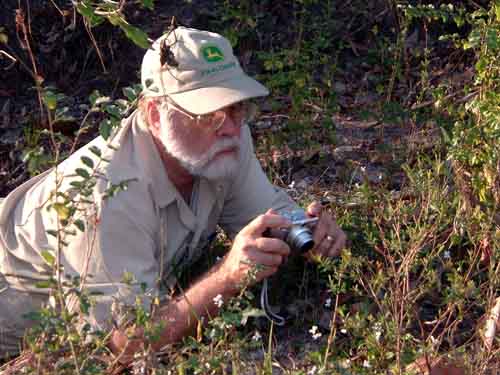

0 Comments:
Post a Comment
<< Home